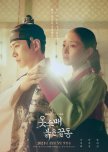Junho's baritone will shake your boots
A good watch, a romantic historical drama from 2021. Junho's baritone will shake your boots and the FL, Lee Se Young, always refuses to be a doormat (no midway sudden caving into passivity). A very very excellent script properly restrained by historical facts, which imagines real people struggling in a real world with love, responsibility and agency.
On a cautious search for oldies but goodies I found this and recommend it for 3 reasons. 1/ It makes really good use of the idol-actor Junho. 2/ It is the very best kind of pleasant sageuk -- real content, real problems, best outcomes possible within limits. 3/ A great example of 2 of the best features of asian dramas in general: the use of dramatic problematics (underlying social issues) and the humanization of villains -- especially in formulaic romantic and comic dramas.
1. Junho was brilliant in Just Between Lovers/Rain or Shine (2017), but for just a second or two I warily watched him here for King the Land signs of blandness; decided it is how the script and director use his talents that matters. As an ML who hesitates to be vulnerable Junho's stolidity works. As Crown Prince Yi San/King Jeonjo he is at his most masculine and charismatic -- that voice! The underlying problematic of the show is issues of consent, and without Junho this would skirt ugliness. With him it is a swoon a minute.
2. Sageuk is an unexportable Korean miracle due to the unique continuous history of Korea -- C-drama is similarly so. I absolutely adore the rationality/ethical concerns of Cdrama and I equally love the emotional royal family contretemps of sageuk. The soundtrack has a hopeful sweet lilt, factions at court and within the royal family are clear (no confusing three or four old ministers dressed the same with similar facial hair). True love eventually sort of wins but real social problems are not glossed over.
3. In historical or history-fantasy dramas, the dramatic use of modern problematics does not feel anachronistic; rather, it is used to deepen or heighten the surface emotional response of viewers to the basic plot. By problematics I mean underlying issues which are treated as recurring dramatic notes or nexus, not for exposition or persuasion. The issue of consent deepens our understanding of the sadness of the situation of the court ladies who are prisoners for life within the palace.
So many of the supporting characters in Red Sleeve have little perfect moments of lived life in the show, but especially the villains are treated as flawed human beings in an inhumane world. The old King, paranoid, ruthless and beloved by his grandson the ML, is developing dementia. Lee Deokhwa as the King is amazing, watch the good and the bad of his character unfold through the show.
On a cautious search for oldies but goodies I found this and recommend it for 3 reasons. 1/ It makes really good use of the idol-actor Junho. 2/ It is the very best kind of pleasant sageuk -- real content, real problems, best outcomes possible within limits. 3/ A great example of 2 of the best features of asian dramas in general: the use of dramatic problematics (underlying social issues) and the humanization of villains -- especially in formulaic romantic and comic dramas.
1. Junho was brilliant in Just Between Lovers/Rain or Shine (2017), but for just a second or two I warily watched him here for King the Land signs of blandness; decided it is how the script and director use his talents that matters. As an ML who hesitates to be vulnerable Junho's stolidity works. As Crown Prince Yi San/King Jeonjo he is at his most masculine and charismatic -- that voice! The underlying problematic of the show is issues of consent, and without Junho this would skirt ugliness. With him it is a swoon a minute.
2. Sageuk is an unexportable Korean miracle due to the unique continuous history of Korea -- C-drama is similarly so. I absolutely adore the rationality/ethical concerns of Cdrama and I equally love the emotional royal family contretemps of sageuk. The soundtrack has a hopeful sweet lilt, factions at court and within the royal family are clear (no confusing three or four old ministers dressed the same with similar facial hair). True love eventually sort of wins but real social problems are not glossed over.
3. In historical or history-fantasy dramas, the dramatic use of modern problematics does not feel anachronistic; rather, it is used to deepen or heighten the surface emotional response of viewers to the basic plot. By problematics I mean underlying issues which are treated as recurring dramatic notes or nexus, not for exposition or persuasion. The issue of consent deepens our understanding of the sadness of the situation of the court ladies who are prisoners for life within the palace.
So many of the supporting characters in Red Sleeve have little perfect moments of lived life in the show, but especially the villains are treated as flawed human beings in an inhumane world. The old King, paranoid, ruthless and beloved by his grandson the ML, is developing dementia. Lee Deokhwa as the King is amazing, watch the good and the bad of his character unfold through the show.
Vond je deze recentie nuttig?



